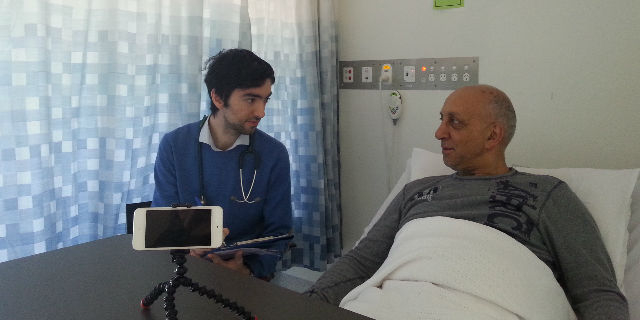Wearable cameras and electronic tools

On Friday 2 December 2015 two projects featured in the poster session of the Innovation Showcase highlighted innovative work around assessment and feedback currently underway in the MMS Department of Medical Education (DME).
- using wearable cameras for teaching, learning and self-assessment
Fourth year MD student Thomas Sellitto presented his work on the use of wearable cameras for teaching, learning and self-assessment, his Scholarly Selective research project in 2015. In this project medical students used iPod Touch devices to film themselves during ‘long-case’ patient interviews. Students independently reviewed their footage and edited it down into a series of short ‘highlight’ clips of about five minutes in total length to present and discuss during a regular small group tutorial with an experienced clinician. Students felt that reviewing and editing their video helped with their self-reflection. An analysis of tutorial transcripts also revealed the presentation of video clips within tutorials actively stimulated peer discussion. Importantly, the presentation of videos allowed students and tutors to identify and discuss key incidents and learning moments that were not picked up during students’ normal oral presentations.
- delivering post-test feedback to medical students throughout the MD program
Tom’s supervisors Drs Terry Judd and Anna Ryan presented a second project at the Showcase highlighting their work in delivering post-test feedback to medical students throughout the MD program. Their work centers on the development of electronic tools for the creation, delivery and scoring of tests, in addition to generating and distributing personalised feedback reports of test results and progress to students and staff. The work presented at the Showcase illustrated the student feedback reports distributed to students following formative Multiple Choice Question (MCQ) tests and Situational Judgement Tests, suggesting that general format may be suited to a range of MCQ (and related item types) based assessments. Software tools developed as part of this project are used to import, collate and analyse test results, generate personalised reports containing the students’ results, normative comparative data and item level feedback, and then distribute them to students via email. These tools have already been used to produce and distribute four sets of individualised Progress Test reports (to an average of 120 3rd and 4th year students) and six sets of Situational Judgement Test reports (to an average of 330 4th year students) over the past two years. Acceptance of both types of reports by students has been excellent. Ongoing work is underway around the development of advanced prototypes for desktop and mobile test clients, and design and implementation of an assessment database (and course wide taxonomy) to provide consistency in feedback messages across all years of the course.